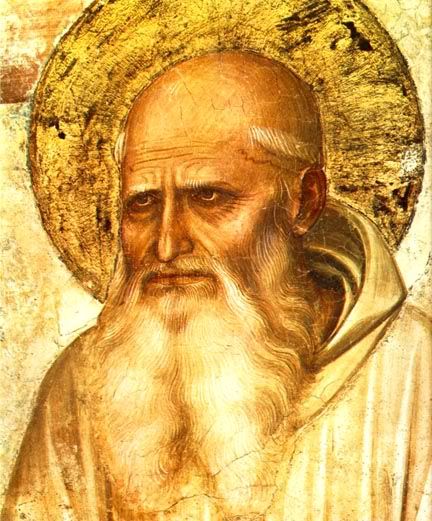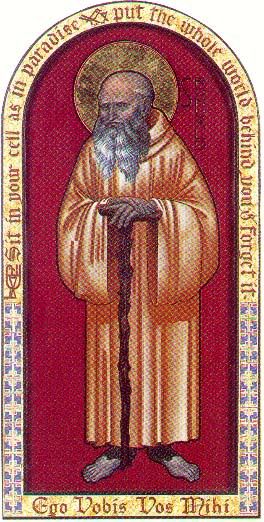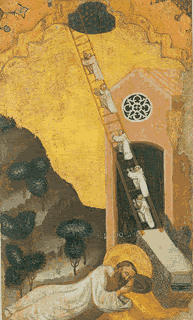Today, June 19, we celebrate the feast day of Saint Romuald (951-1027), abbot and founder of the austere Order of Camaldoli in Tuscany. The life of Saint Romuald was one of quiet contemplation, hermitude, instruction, and foundation of his Christian brothers. Due to his patient leadership, modeling of Christian virtue, and continuous prayer for the reparation of the sins of mankind, Saint Romuald inspired the foundation and rapid growth of religious communities. In art, he is often pictured as holding a ladder, on which monks are climbing to Heaven, bolstered by his faith and love of the Lord.
Romuald was born in Ravenna in central Italy, and spent his childhood in wayward pursuits. While he was occasionally drawn to holiness, especially while hunting in the wilderness, upon returning to society he found himself falling victim to temptation. On the occasions he was alone in the forest, he would exclaim, “How happy were the ancient hermits, who had such habitations! With what tranquility could they serve God, free from the tumult of the world!" While Romuald desired the holy life, he was tormented by the Devil, and frequently succumbed.
When still a young man, his aristocratic father encouraged Romuald to watch him participate in a duel. Romuald was horrified when his father killed his opponent, and the Lord moved within him, causing him to flee to the Benedictine Abbey of Sant'Apollinare in Classe. There, he remained in silence and fasting for forty days, assuming responsibility for the sins of his father, and begging for forgiveness and reparation. During this time, he performed great austerities, and prayed and wept almost without ceasing. So was the purity of his heart, and the sincerity of his repentance, the Lord filled him with the Holy Spirit, and his faith deepened. He eventually became a monk at the Abby, later becoming Abbot.
Saint Romuald went on to found several monasteries throughout Italy prior to founding a new order, the austere Order of Camaldoli in Tuscany. His order encouraged an extreme austerity, fasting, mortification, prayer, and silence. The Rules of the Order, written by saint Romuald, stated:
“Be seated within your cell as though in paradise; cast to the rear of your memory everything distracting, becoming alert and focused on your thoughts as a good fisherman is on the fish. One pathway to this state is through reciting the Psalms; do not neglect this. If you cannot manage to get through them all at one sitting as you used to do with the fervor of a novice, take pains to chant the psalms in your spirit, now starting from this place, now from that, and to interpret them in your mind, and when you begin to wander in your reading, don’t stop what you are doing, but make haste to correct by interpreting; place yourself above all in the presence of God with fear and trembling, like one who stands in the gaze of the emperor; pull yourself completely and crouch down like a baby chick, content with God’s gift, for, unless its mother provides, it neither knows nor gets what she should eat.”
Saint Romuald spent his days founding additional monasteries, and building his order. Through his example, the monks under his direction grew in holiness through prayer, self-denial, and contemplation. Romuald himself preferred solitude, building himself a cell wherever he arrived, and barring the door. There, he would spend endless days in contemplation of the Lord, crying ceaselessly, and bathing himself in the love of Christ. On one occasion in his life, when he was living in hermitude, the Devil visited him, and would not stop his torment. For days, Romuald prayed against the Devil, such that physical wounds appeared on his flesh. Finally, he cried aloud, “Sweetest Jesus, dearest Jesus, why hast thou forsaken me? Hast thou entirely delivered me over to my enemies?" At the utterance of the name of Jesus, the Devil departed, and Saint Romuald was comforted, the “excess of divine sweetness and compunction filled the breast of Romuald, that he melted into tears, and his heart seemed quite dissolved.”
From the writings of Saint Damian: “St. Romuald built many other monasteries, and continued three years at one he founded near Parenzo, one year in the community to settle it, and two in a neighboring cell. Here he labored some time under a spiritual dryness, not being able to shed one tear; but he ceased not to continue his devotions with greater fervor. At last being in his cell, at those words of the psalmist, "I will give thee understanding, and will instruct thee," he was suddenly visited by God with an extraordinary light and spirit of compunction, which from that time never left him. By a supernatural light, the fruit of prayer, he understood the holy scriptures, and wrote an exposition of the psalms full of admirable unction. He often foretold things to come, and gave directions full of heavenly wisdom to all who came to consult him, especially to his religious who frequently came to ask his advice how to advance in virtue, and how to resist temptations he always sent them back to their cells full of an extraordinary cheerfulness. Through his continual weeping he thought others had a like gift, and often said to his monks, "Do not weep too much; for it prejudices the sight and the head."
As Saint Romuald aged, he spent more and more time in solitude, increasing his austerities and fasts. He constantly wore a shirt of hair, causing great discomfort. He ate only gruel, and if anything else was presented to him would cry out, “Oh, gluttony, gluttony, thou shalt never taste this : perpetual war is declared against thee." The monks of his order were also remarkable for their austere lives, always going barefoot, and continually fasting by his model, limiting themselves to gruel and water. Through his holiness, many cures of the sick were offered, with the ill making pilgrimage to touch the door of his cell.
Saint Romuald was frequently moved to tears during the celebration of Mass, such was his experience of Jesus in the Consecration. From his biography written by Saint Peter Damian just fifteen years after his death: “Frequently he was seized by so great a contemplation of divinity that he would be reduced to tears with the boiling, indescribable heat of divine love. In this condition he would cry out: Beloved Jesus, beloved, sweet honey, indescribable longing, delight of the saints, sweetness of angels, and other things of this kind. We are unable to express the ecstasy of these utterances, dictated by the Holy Spirit.”
With his life’s work complete, and his community built and thriving across Italy, Saint Romuald foretold his death, and went to it with great joy. During his life, he had prayed for a martyr’s death, and had sought permission to do mission work in Hungary. Permitted by the pope, whenever Saint Romuald began his travels, he would fall ill. After several incidents, it became clear to the holy man that the Lord wished him to stay with his community, which he did, until his death. Saint Peter Damian, in his biography of Saint Romuald, described the last days of Saint Romuald:
“Romuald lived in the vicinity of the city of Paranzo for three years. In the first year he built a monastery and appointed an abbot with monks. For the next two years he remained there in seclusion. Wherever the holy man might arrange to live, he would follow the same pattern. First he would build an oratory with an altar in a cell; then he would shut himself in and forbid access. Finally, after he had lived in many places, perceiving that his end was near, he returned to the monastery he had built in the valley of Castro. While he awaited with certainty his approaching death, he ordered a cell to be constructed there with an oratory in which he might isolate himself and preserve silence until death. Accordingly, the hermitage was built, since he had made up his mind that he would die there. His body began to grow more and more oppressed by afflictions and was already failing. One day he began to feel the loss of his physical strength under all the harassment of increasingly violent afflictions. As the sun was beginning to set, he instructed two monks who were standing by to go out and close the door of the cell behind them; they were to come back to him at daybreak to celebrate matins. They were so concerned about his end that they went out reluctantly and did not rest immediately. On the contrary, since they were worried that their master night die, they lay hidden near the cell and watched this precious treasure. For some time they continued to listen attentively until they heard neither movement nor sound. Rightly guessing what had happened, they pushed open the door, rushed in quickly, lit a candle and found the holy man lying on his back, his blessed soul snatched up into heaven.”
Saint Romuald’s body was buried at the monastery in Paranzo. Three decades later, his incorrupt body was transferred to Fabriano in 1481. Many miracles have been reported at his tombside in the great Cathedral of Fabriano. The Order he founded continues to operate today, with five distinct congregations. The most austere of those, the hermits, continue to live in a manner much like that of Saint Romuald—strict adherence to silence and prayer for the reparation of the sins of mankind.
The quiet and contemplative life of Saint Romuald reminds us—much like the life of Saint Marina the Monk—that humility, meekness, and a deep desire for the Lord are the hallmarks of our faith. These simple tenets, lived as model for others, are a powerful witness to the depth of our hope and confidence in the Lord, a reminder of our obedience to Him, and a powerful call to center ourselves in Him. When we pray, as Saint Romuald said, our bodies, hearts, souls, and minds should be focused solely on God: "Better to pray one psalm with devotion and compunction than a hundred with distraction."
Father, through Saint Romuald you renewed the life of solitude and prayer in your Church. By our self-denial as we follow Christ bring us the joy of heaven. We ask this through our Lord Jesus Christ, your Son, who lives and reigns with you and the Holy Spirit, one God, for ever and ever. Amen.
Year 2: Day 170 of 365
Prayer Intentions: Patience and humility; For those wrongly accused; For those who are misunderstood or judged.
Requested Intentions: For a mother’s mental health and for kindness and forgiveness, for housing problems, for dental health (T); For the soul of a departed friend (X); Restoration of health (D); Successful employment for couple (N); For employment for children (K); For health of friend, for successful relationships for children, for safe pregnancy for daughter (C); For the health of a mother (J); Virtue for daughter (V); Successful acceptance to college for nephew (M); For the health of a cousin (T); Freedom from legal difficulties for husband (S); Husband’s freedom from illness (L); Personal intentions (S); Successful passing of dental board examination (P); Blessings on a family (Z); Successful permanent employment (C); Healing of a son with autism (J)














this is a wonderful blog and truly inspiring, thanks for sharing your passion in faith, God bless you.
ReplyDelete